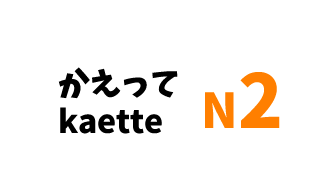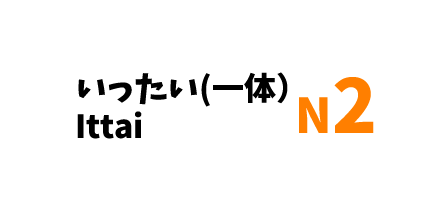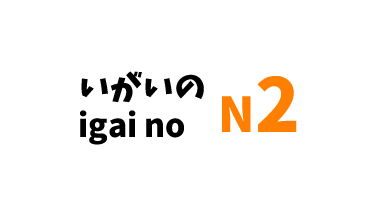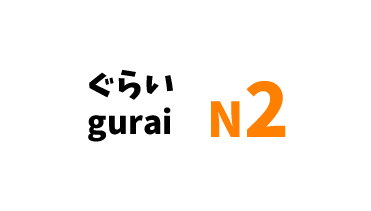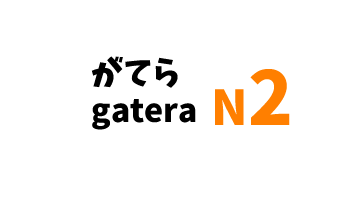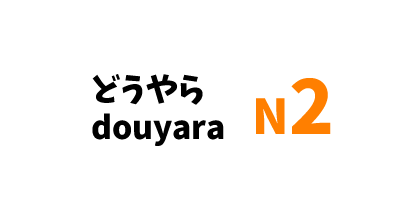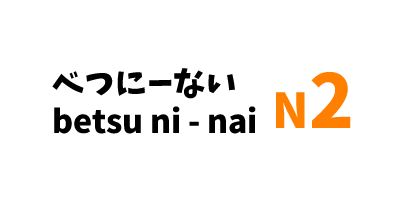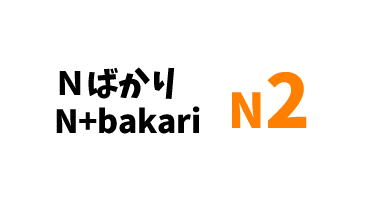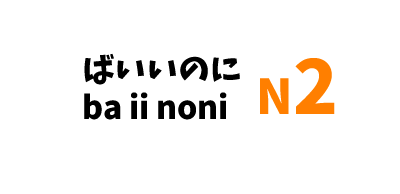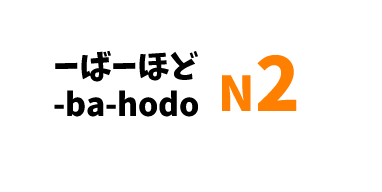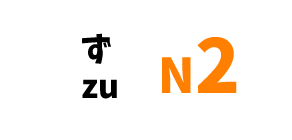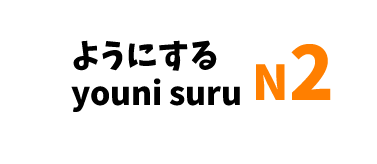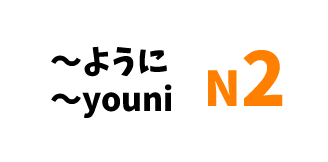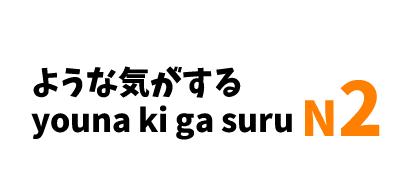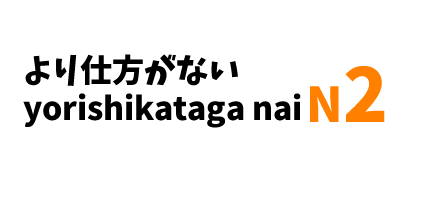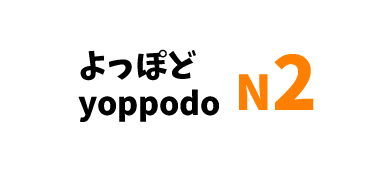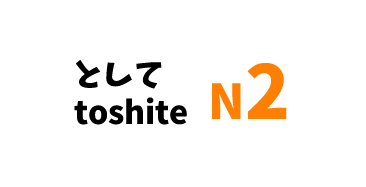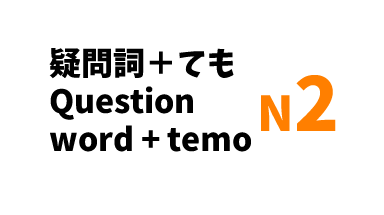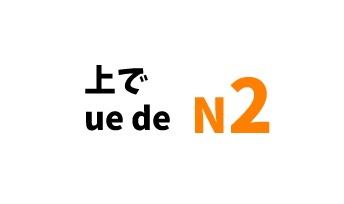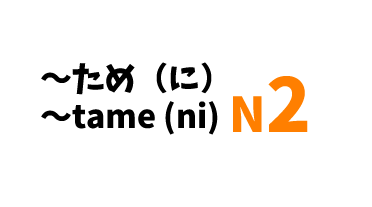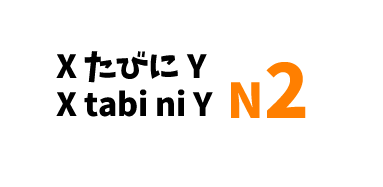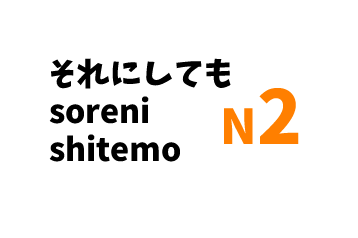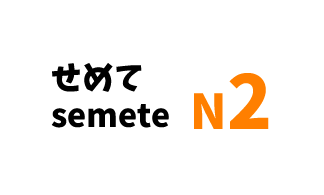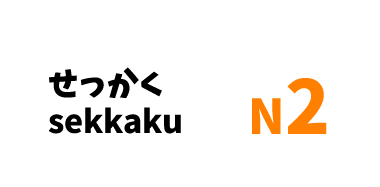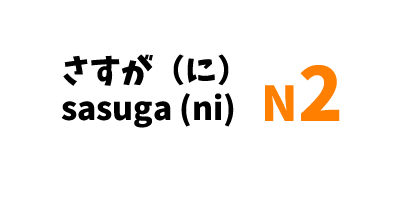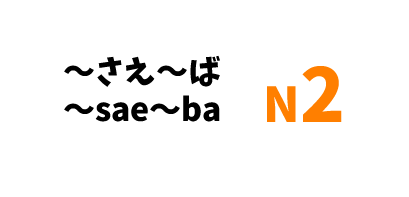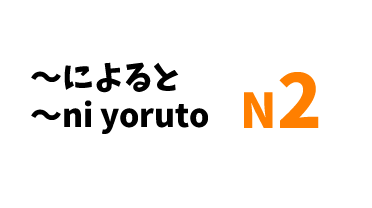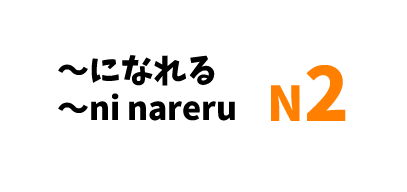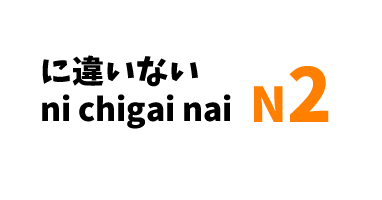かえって kaette How to make”かえって.” in Japanese. ・ Meaning: on the contrary ・ JLPT Level: … 【N2】かえって /kaetteRead more
STUDY JLPT
STUDY JLPT
【N2】いったい(一体)/ Ittai
いったい(一体) Ittai How to make”いったい(一体).” in Japanese. ・ Meaning: 強調、emphasis , on the earth ・ … 【N2】いったい(一体)/ IttaiRead more
【N2】~いがいの /~igai no
いがいの igai no How to make”いがいの.” in Japanese. ・ Meaning: other than ・ JLPT Level: … 【N2】~いがいの /~igai noRead more
【N2】~ほど/~ hodo
ほど hodo How to make”ほど.” in Japanese. ・ Meaning: express degree ・ JLPT Level: 2 … 【N2】~ほど/~ hodoRead more
【N2】Nをはじめ /N wo hajime
Nをはじめ N wo hajime How to make”Nをはじめ.” in Japanese. ・ Meaning: starting with – , … 【N2】Nをはじめ /N wo hajimeRead more
【N2】~ぐらい/~ gurai
ぐらい gurai How to make”ぐらい.” in Japanese. ・ Meaning: N is the minimum level,degree etc, … 【N2】~ぐらい/~ guraiRead more
【N2】~がてら /~gatera
がてら gatera How to make”がてら.” in Japanese. ・ Meaning: A while B,AとBを一緒にする。 ・ JLPT Level: … 【N2】~がてら /~gateraRead more
【N2】~ふり /~furi
ふり furi How to make”ふり.” in Japanese. ・ Meaning: <~ふりをする>まねる。うその様子をする。 pretend to be ・ JLPT … 【N2】~ふり /~furiRead more
【N2】どうやら /douyara
どうやら douyara How to make”どうやら.” in Japanese. ・ Meaning: likely ・ JLPT Level: 2 日本語能力試験N2級レベル … 【N2】どうやら /douyaraRead more
【N2】べつにーない/ betsu ni – nai
べつにーない betsu ni – nai How to make”べつにーない.” in Japanese. ・ Meaning: not particulaly ・ … 【N2】べつにーない/ betsu ni – naiRead more
【N2】Nばかり/ N+bakari
Nばかり N+bakari How to make”Nばかり..” in Japanese. ・ Meaning: nothing but.. ・ JLPT Level: 2 … 【N2】Nばかり/ N+bakariRead more
【N2】~ばいいのに /~ba ii noni
ばいいのに ba ii noni How to make”ばいいのに..” in Japanese. ・ Meaning: You should ( suggestion … 【N2】~ばいいのに /~ba ii noniRead more
【N2】ーばーほど /-ba-hodo
ーばーほど -ba-hodo How to make”ーばーほど..” in Japanese. ・ Meaning: The more/less – ,The more/less ・ … 【N2】ーばーほど /-ba-hodoRead more
【N2】~ず/ ~zu
~ず ~zu How to make”~ず..” in Japanese. ・ Meaning: without doing something ・ JLPT Level: … 【N2】~ず/ ~zuRead more
【N2】~ようにする /~youni suru
~ようにする ~youni suru How to make”~ようにする..” in Japanese. ・ Meaning: to make an effort to … 【N2】~ようにする /~youni suruRead more
【N2】~ように /~youni
~ように ~youni How to make”~ように..” in Japanese. ・ Meaning: X ように Y = Y so that … 【N2】~ように /~youniRead more
【N2】~ような気がする/ ~youna ki ga suru
~ような気がする ~youna ki ga suru How to make”~ような気がする ..” in Japanese. ・ Meaning: to have … 【N2】~ような気がする/ ~youna ki ga suruRead more
【N2】~より仕方がない/ ~yori shikata ga nai
~より仕方がない ~yori shikata ga nai How to make”~より仕方がない ..” in Japanese. ・ Meaning: to have … 【N2】~より仕方がない/ ~yori shikata ga naiRead more
【N2】よっぽど/ yoppodo
よっぽど yoppodo How to make”よっぽど ..” in Japanese. ・ Meaning: 本当に、really,to a great extent ・ … 【N2】よっぽど/ yoppodoRead more
【N2】~わけにはいかない/~wakeniwa ikanai
わけにはいかない wakeniwa ikanai How to make”わけにはいかない ..” in Japanese. ・ Meaning: 状況によってできない。 can not do … 【N2】~わけにはいかない/~wakeniwa ikanaiRead more
【N2】~とともに /~totomoni
とともに to tomoni How to make”とともに ..” in Japanese. ・ Meaning: と並び、 together with , … 【N2】~とともに /~totomoniRead more
【N2】~として/~ toshite
として toshite How to make”として ..” in Japanese. ・ Meaning: as.. ・ JLPT Level: 2 … 【N2】~として/~ toshiteRead more
【N2】疑問詞+ても /Question word + temo
疑問詞+ても Question word + temo How to make”上で ..” in Japanese. ・ Meaning: no matter … 【N2】疑問詞+ても /Question word + temoRead more
【N2】上で ue de
上で ue de How to make"上で .." in Japanese. ・ Meaning: upon, after ・ JLPT … 【N2】上で ue deRead more
【N2】~ため(に)/ ~tame (ni)
~ため(に) ~tame (ni) How to make”~ため(に) ..” in Japanese. ・ Meaning: due to, because ・ … 【N2】~ため(に)/ ~tame (ni)Read more
【N2】X たびに Y/ X tabi ni Y
X たびに Y X tabi ni Y How to make”X たびに Y ..” in Japanese. … 【N2】X たびに Y/ X tabi ni YRead more
【N2】それにしても/ soreni shitemo
それにしても soreni shitemo How to make”それにしても..” in Japanese. ・ Meaning: even so,even for ,at any … 【N2】それにしても/ soreni shitemoRead more
【N2】せめて /semete
せめて semete How to make”せめて..” in Japanese. ・ Meaning: 少なくとも、at least,at most a small thing … 【N2】せめて /semeteRead more
【N2】せいぜい/ seizei
せいぜい seizei How to make”せいぜい..” in Japanese. ・ Meaning: at most 、できるだけ。精一杯。最大限 ・ JLPT Level: … 【N2】せいぜい/ seizeiRead more
【N2】せっかく/ sekkaku
せっかく sekkaku How to make”せっかく..” in Japanese. ・ Meaning: なにか苦労して費やした時つかう。 with much trouble, with taking … 【N2】せっかく/ sekkakuRead more
【N2】さすが(に)/ sasuga (ni)
さすが(に) sasuga (ni) How to make”さすが(に)..” in Japanese. ・ Meaning: indeed, 話し手が話している文で感心したものに使う,as expected, after all … 【N2】さすが(に)/ sasuga (ni)Read more
【N2】~さえ~ば /~sae~ba
~さえ~ば ~sae~ba How to make”~さえ~ば…” in Japanese. ・ Meaning: if only you do something ・ … 【N2】~さえ~ば /~sae~baRead more
【N2】思うように /omou youni
思うように omou youni How to make”思うように…” in Japanese. ・ Meaning: as one wishs. as one … 【N2】思うように /omou youniRead more
【N2】~によると /~ni yoruto
~によると ~ni yoruto How to make”~によると…” in Japanese. ・ Meaning: according to… ・ JLPT Level: … 【N2】~によると /~ni yorutoRead more
【N2】~になれる/ ~ni nareru
~になれる ~ni nareru How to make”~になれる…” in Japanese. ・ Meaning: to be used to…, ・ … 【N2】~になれる/ ~ni nareruRead more
【N2】~に違いない/ ~ni chigai nai
~に違いない ~ni chigai nai How to make”~に違いない…” in Japanese. ・ Meaning: it must be,no mistake…definitely … 【N2】~に違いない/ ~ni chigai naiRead more
